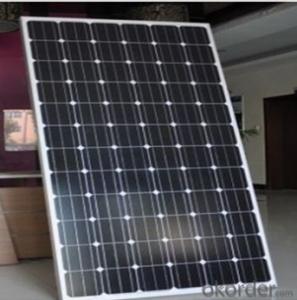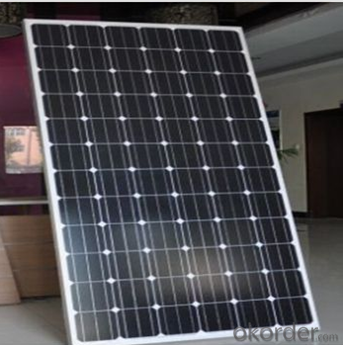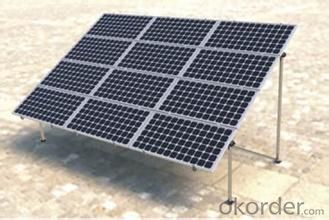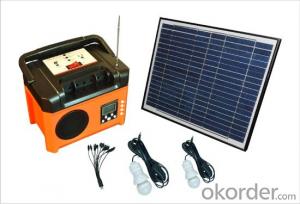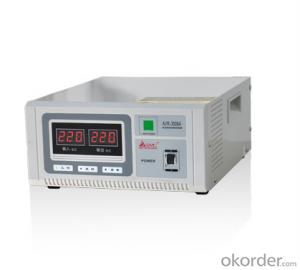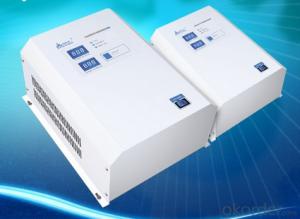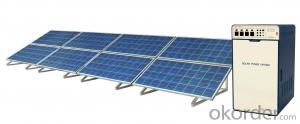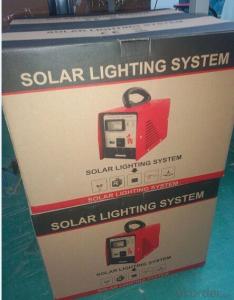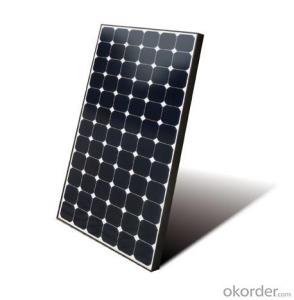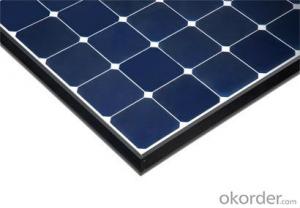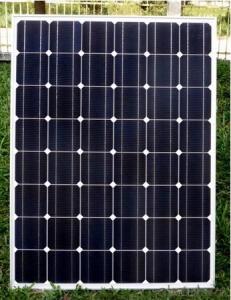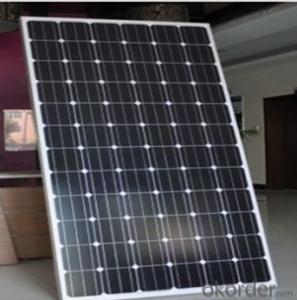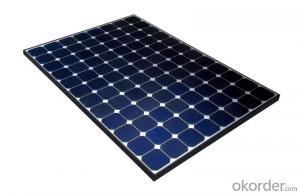5000w On Grid Solar Energy Systems - TÜV UL CE Approved Solar Home Solution
- Loading Port:
- China main port
- Payment Terms:
- TT OR LC
- Min Order Qty:
- 1 pc
- Supply Capability:
- 100 pc/month
OKorder Service Pledge
OKorder Financial Service
You Might Also Like
Specification
5000W Solar Home Solution Approved by TUV UL CE
Production description
PV array:
Convert sunlight instantly into DC electric power. Formed by the solar modules (also called photovoltaic
modules) in accordance with the system requirements for series and parallel.
Solar charge controller:
Battery banks:
Stores energy when there is an excess coming in and distribute it back out when there is a demand. Solar
PV panels continue to re-charge batteries each day to maintain battery charge.
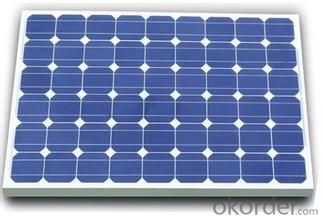
Feature
1.High conversion efficiencies resulting in superior power output performance.
2.Outstanding power output even in low light or high temperature conditions
3.Optimized design for ease of soldering and lamination
4.Long-term stability,reliability and performance
5.Low breakage rate
6.Color uniformaity
Physical characteristic
1. Rigorous quality control meets the highest international standards.
2. High-transmissivity low-iron tempered glass, strong aluminium frame.
3. Using UV-resistant silicon.
4. IS09001/14001/CE/TUV/UL
- Q: Can solar energy systems be used for powering public transportation systems like buses or trains?
- Yes, solar energy systems can indeed be used to power public transportation systems such as buses or trains. Solar panels can be installed on the roofs of buses or along railway tracks to harness sunlight and convert it into electricity. This renewable energy source can help reduce reliance on fossil fuels, lower emissions, and make public transportation more sustainable and environmentally friendly.
- Q: Can solar energy systems be used in powering agricultural processing facilities?
- Yes, solar energy systems can be used to power agricultural processing facilities. Solar energy systems, such as photovoltaic (PV) panels, can generate electricity from sunlight, which can then be used to power various electrical equipment and processes in agricultural processing facilities. This can include powering machinery used for cleaning, sorting, and packaging agricultural products, as well as running heating, ventilation, and air conditioning systems. Solar energy systems can also be integrated with battery storage solutions to provide a reliable and continuous power supply, even during periods of low sunlight or at night. Additionally, using solar energy to power agricultural processing facilities can help reduce reliance on fossil fuels, lower greenhouse gas emissions, and contribute to a more sustainable and environmentally friendly operation.
- Q: Are there any risks of electrical short circuits with solar energy systems?
- Yes, there are risks of electrical short circuits with solar energy systems. Just like any other electrical system, solar energy systems can be susceptible to short circuits. A short circuit occurs when there is an unintended path of low resistance that allows a large amount of current to flow. This can happen due to various reasons such as faulty wiring, damaged components, or improper installation. Short circuits can result in overheating, electrical fires, or damage to the system. The high current flow generated by a short circuit can cause wires to melt, insulation to burn, and can even damage the solar panels themselves. In extreme cases, short circuits can lead to explosions or other serious safety hazards. To mitigate the risks of short circuits, it is crucial to ensure proper installation by qualified professionals who follow safety guidelines and adhere to local electrical codes. Regular maintenance and inspection of the system are also important to identify and address any potential issues. It is recommended to have a circuit breaker or fuse installed within the system to automatically disconnect the circuit in case of a short circuit. Additionally, the use of high-quality components and wiring that are specifically designed for solar energy systems can help minimize the risks of short circuits. It is also important to follow manufacturer's instructions and guidelines for system maintenance and operation. Overall, while the risks of electrical short circuits with solar energy systems exist, they can be effectively managed and minimized through proper installation, regular maintenance, and adherence to safety guidelines.
- Q: Are there any safety certifications required for solar energy systems?
- Solar energy systems require safety certifications to ensure their safe operation. In most countries, these systems must meet specific safety standards and regulations before installation. These certifications guarantee that the solar panels, inverters, and other components are manufactured and installed in a way that minimizes electrical hazards, fire risks, and other safety concerns. The International Electrotechnical Commission (IEC) 61730 standard is one of the most common safety certifications for solar energy systems. It ensures that the solar panels meet strict safety requirements, including mechanical strength, resistance to environmental factors, and electrical insulation. It also includes tests for fire resistance, which is crucial to prevent potential hazards. Safety certifications are also required for solar inverters, which convert the DC generated by solar panels into the AC used in homes and businesses. The IEC 62109 standard is widely recognized for verifying that inverters meet safety requirements such as electrical insulation, protection against overvoltage and overcurrent, and proper grounding. Moreover, the installation of solar energy systems must comply with local electrical and building codes that often incorporate safety requirements. These codes guarantee correct and safe installation, including proper wiring, grounding, and protection against electrical faults. Adhering to these safety certifications and regulations is essential for solar energy system manufacturers, installers, and users. It ensures the safe and reliable operation of the systems, minimizing the risk of electrical accidents, fires, and other safety hazards. This provides peace of mind to both system owners and the surrounding community.
- Q: Can solar energy systems be used in powering hotels or resorts?
- Certainly, hotels and resorts can make use of solar energy systems to power their facilities. Solar power is a renewable and clean energy source that can effectively meet the energy requirements of these establishments. Hotels and resorts typically consume a substantial amount of energy for various purposes, such as lighting, heating, cooling, and running electrical appliances and equipment. To harness the abundant sunlight, hotels and resorts can opt to install solar panels on their rooftops or in open areas. This allows them to convert sunlight into electricity, which can then be used to power the entire facility. By doing so, these establishments reduce their dependence on traditional energy sources, resulting in a decreased carbon footprint. In addition to its environmental advantages, solar energy systems can offer financial benefits to hotels and resorts. By generating their own electricity, these establishments can significantly lower or eliminate their utility bills, leading to substantial cost savings in the long run. Furthermore, some countries provide incentives, grants, or tax credits for the implementation of solar power systems, making such installations economically viable. Moreover, the availability of solar energy is not limited to sunny days. With advancements in technology, solar panels can still generate electricity even during cloudy or overcast conditions. Furthermore, any excess energy produced during peak sunlight hours can be stored in batteries for later use, ensuring a steady power supply throughout the day and night. By adopting solar energy systems, hotels and resorts can demonstrate their commitment to sustainability and environmental responsibility. This can serve as a valuable marketing tool, attracting environmentally conscious guests who prefer eco-friendly accommodations. It also aligns with the growing trend of sustainable tourism, enhancing the reputation and competitiveness of these establishments in the industry. Overall, solar energy systems are a practical and efficient solution for powering hotels and resorts. They offer a multitude of benefits, including reduced utility costs, environmental sustainability, and increased market appeal. As technology continues to advance and become more affordable, more hotels and resorts are embracing solar power as a reliable and clean energy source.
- Q: How does the presence of birds or other wildlife affect the performance of solar panels?
- Solar panels may be affected by the presence of birds or other wildlife in various ways. One of the primary concerns is the potential for bird droppings to accumulate on the panel's surface. This can lead to a layer of dirt and debris, reducing the amount of sunlight that can reach the solar cells. Consequently, the efficiency of the panels may decrease, resulting in a decline in overall performance. Another issue arises from the possibility of birds or other wildlife building nests or habitats near or on the solar panel systems. These nests can obstruct the sunlight from reaching the panels, leading to a decrease in energy production. Moreover, if these nests are constructed in close proximity to the panels, they can potentially cause damage to the panels or their mounting structures. Furthermore, larger birds such as raptors or pigeons may occasionally perch on the solar panels, causing physical harm to the panels or the wiring. This can result in malfunctions or a reduction in electrical output. To address these potential issues, there are several available solutions. One common approach involves using deterrents like bird spikes, netting, or scare devices to prevent birds from landing or nesting on the panels. Regular cleaning and maintenance of the panels are also crucial to eliminate any bird droppings or debris that may accumulate. Additionally, designing solar panel systems with bird-friendly features in mind can help minimize the impact on wildlife. For instance, incorporating gaps or spaces between panels can discourage birds from nesting while still allowing sufficient airflow for cooling. In conclusion, although the presence of birds or other wildlife may pose challenges for solar panels, implementing preventive measures and maintenance practices can help ensure optimal performance and prolong the system's lifespan.
- Q: Can solar energy systems be used in powering agricultural processing facilities?
- Yes, solar energy systems can be used to power agricultural processing facilities. Solar panels can be installed on the rooftops or surrounding land of these facilities to generate electricity. This renewable energy source can provide a reliable and cost-effective solution to meet the power requirements of various agricultural processing operations, such as drying, milling, refrigeration, and packaging. Additionally, solar energy systems can help reduce greenhouse gas emissions and dependence on fossil fuels, making them an environmentally sustainable choice for powering agricultural processing facilities.
- Q: Can solar energy systems be used for powering wineries?
- Yes, solar energy systems can be used for powering wineries. Solar panels can be installed on winery rooftops or in nearby areas to generate electricity for various operations, including lighting, refrigeration, heating, cooling, and machinery. This not only helps wineries reduce their carbon footprint and energy costs but also promotes sustainability in the wine industry. Additionally, solar power can be stored in batteries for use during the night or on cloudy days, ensuring a continuous and reliable energy supply.
- Q: Are there any risks of electrical malfunction or failure with solar energy systems?
- Yes, there are some risks of electrical malfunction or failure with solar energy systems. These can include issues such as faulty wiring, damage to solar panels, or inverter failures. Additionally, extreme weather conditions like lightning strikes or power surges can also pose a risk. However, proper maintenance, regular inspections, and adherence to safety guidelines can help mitigate these risks and ensure the safe and efficient functioning of solar energy systems.
- Q: Can solar energy systems be used for powering streetlights?
- Yes, solar energy systems can be used for powering streetlights. Solar panels can be installed on top of streetlight poles or nearby structures to capture sunlight and convert it into electricity. This renewable energy source eliminates the need for traditional electrical connections, making streetlights more energy-efficient and environmentally friendly. Additionally, solar-powered streetlights can function independently, even during power outages, which improves safety and reduces dependence on the grid.
Send your message to us
5000w On Grid Solar Energy Systems - TÜV UL CE Approved Solar Home Solution
- Loading Port:
- China main port
- Payment Terms:
- TT OR LC
- Min Order Qty:
- 1 pc
- Supply Capability:
- 100 pc/month
OKorder Service Pledge
OKorder Financial Service
Similar products
Hot products
Hot Searches
Related keywords
